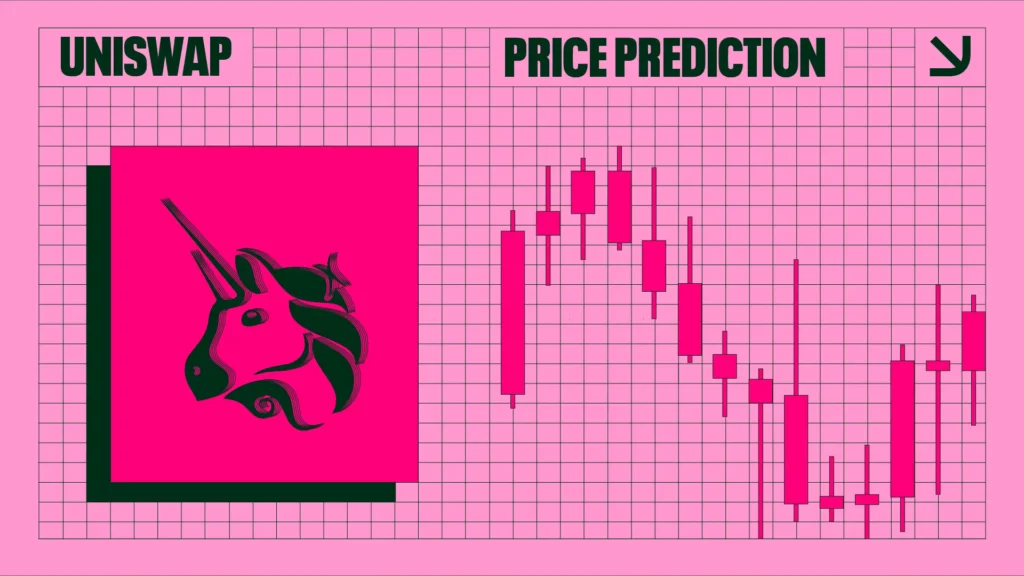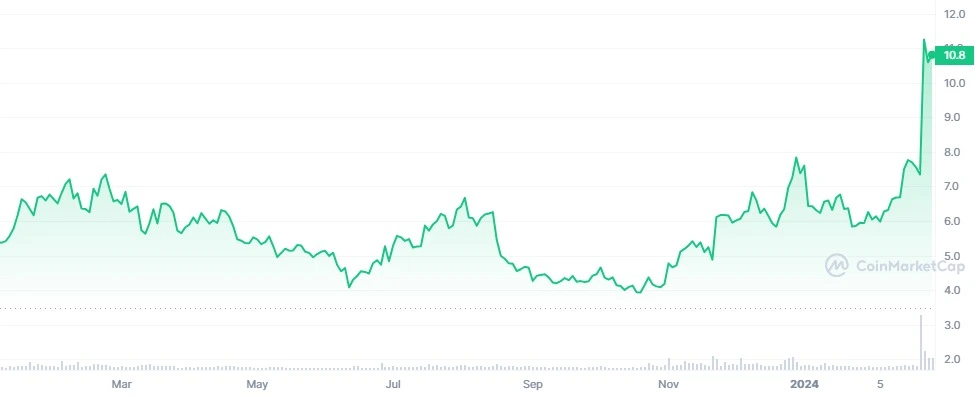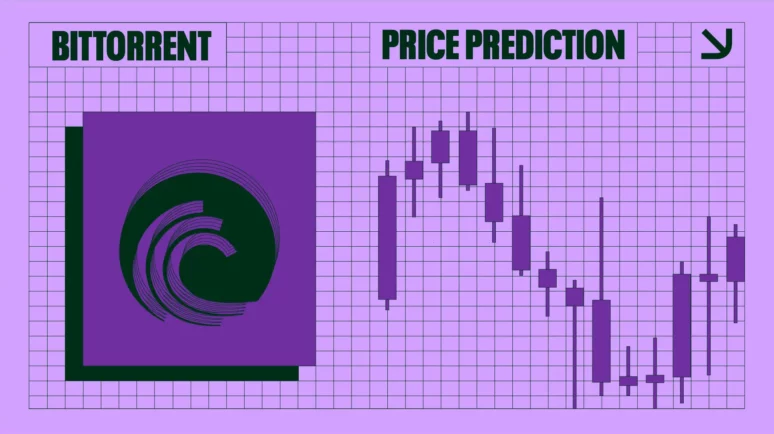Uniswap Price Prediction 2024: What Will V4 Mean for UNI?

What's next for Uniswap?
Key Takeaways
- Uniswap, one of the biggest DEXes, has also seen its price climb following an upgrade.
- Can UNI continue to grow?
- One price prediction says it may reach $28.32 next year.
Uniswap V4, the latest iteration of the Uniswap protocol, could represent a significant advance in decentralized exchanges (DEXs) and automated market makers (AMMs).
Uniswap V4 introduces a new feature called “hooks”, which are essentially smart contracts that can be attached to liquidity pools. These hooks enable a high degree of customization, allowing developers to implement specific functionalities at different points in a pool’s lifecycle, such as before or after swaps and liquidity modifications.
Will V4 boost UNI’s price?
Uniswap did not immediately respond to a request for comment.
But what is Uniswap (UNI)? How does Uniswap work? Let’s see what we can find out, and also take a look at some of the Uniswap Price Predictions that were being made as of February 28, 2024.
Uniswap Price Prediction
Now, let’s look at some of the Uniswap price predictions that were being made on February 28, 2024. It is important to remember that price forecasts, especially for something as potentially volatile as crypto, very often end up being wrong. Also, keep in mind that many longer-term crypto price predictions are made using an algorithm, which means that they can change at a moment’s notice.
| 2024 | 2025 | 2030 | |
|---|---|---|---|
| Prediction #1 | $20.79 | $26.14 | $56.21 |
| Prediction #2 | $23.93 | $28.32 | $81.60 |
| Prediction #3 | $18.08 | $25.97 | $173.86 |
First, CoinCodex ’s short-term Uniswap price prediction was mixed, saying it could fall to $10.19 by March 4 and $11.82 by March 29. The site’s technical analysis was bullish, with 25 indicators sending encouraging signals and just three making bearish ones.
Uniswap Forecast for 2024
In terms of other Uniswap price predictions for 2024, CaptainAltCoin said UNI would go to $20.79 by the end of the year. DigitalCoinPrice was more optimistic, saying it would shoot up to $23.93, while PricePrediction.net thought the token would reach $18.08 this year.
Uniswap Forecast for 2025
When it came to making a Uniswap price prediction for 2025, DigitalCoinPrice was the most optimistic, saying the token would trade at $28.32 that year. PricePrediction.net argued for it to reach $25.97. CaptainAltCoin was more cautious, saying the token would trade at $26.14 next year.
Uniswap Forecast for 2030
Moving on to a more long-term Uniswap price prediction for 2030, PricePrediction.net was the most upbeat, suggesting the token would reach $173.86. CaptainAltCoin had it at $56.21. DigitalCoinPrice was somewhere between the two, saying it would trade at $81.60 in the first year of the next decade.
Google Gemini AI Price Prediction for Uniswap (as of February 28)
Google’s Gemini AI platform gave the following price prediction for Uniswap on February 20. Please remember that the exact price prediction of an asset or cryptocurrency in the future is nearly impossible to achieve. Additionally, artificial intelligent price predictions are predicated on past performances and are in no way entirely accurate.
Short Term (Next 3 months)
- Expected price: $11.70
- Factors to Consider:
- Overall market trends: If the broader cryptocurrency market experiences a bullish run, Uniswap could potentially benefit and see its price rise alongside other cryptocurrencies.
- Regulatory changes: Any regulatory changes or uncertainties surrounding cryptocurrencies could impact investor sentiment and affect Uniswap’s price.
- Uniswap-specific developments: Any significant updates, partnerships, or technological advancements within the Uniswap ecosystem could influence its price positively.
Medium Term (Next 6 months)
- Expected price: $16.58
- Factors to Consider:
- Market sentiment: Overall investor confidence and risk appetite can significantly impact the price of UNI.
- Regulations: Regulatory changes and government stances towards cryptocurrencies can influence market sentiment and price movements.
- Technological advancements: Developments and innovations within the blockchain ecosystem and the broader technology landscape can affect the adoption and utility of UNI, impacting its price.
- Competition: The emergence and success of competing Decentralized Exchanges (DEXs) offering similar functionalities to Uniswap can influence its market share and price.
- Macroeconomic factors: Global economic conditions, such as inflation, interest rates, and geopolitical events, can indirectly impact the cryptocurrency market, including UNI.
Long Term (Next 5 years)
- Expected price: $12.45
- Factors to Consider:
- Regulations: Government regulations can significantly impact the market sentiment and price of cryptocurrencies.
- Adoption: The wider adoption of Uniswap and DeFi (Decentralized Finance) could positively influence its price.
- Market sentiment: Overall market sentiment, including fear and greed, can significantly impact the price of Uniswap.
- Technological advancements: Innovations and advancements within the DeFi space could influence Uniswap’s value.
UNI Price History
Let’s now take a look at some of the Uniswap price history . While past performance should never be taken as an indicator of future results, knowing what the token has done can help give us some very useful context when it comes to either making or interpreting a Uniswap price prediction.
When Uniswap first hit the open market it was worth about $6.50. It went down but then rose again, closing the year at $5.17.
Early 2021 was a boom time for crypto. Uniswap got in on the action, climbing to an all-time high of $44.97. The market fell and UNI dropped to, albeit inconsistently and it closed the year at $17.07, down 62% from its high but up 230% year on year.
In 2022, disaster struck, as the market suffered a string of crashes. UNI fell by about 80% by 18 June, when it traded at $3.31. There was some recovery, but the turmoil caused by the collapse of the FTX exchange meant it closed the year at $5.06. That represented an annual drop of a little over 70%.
Uniswap in 2023 and 2024
Things got worse for UNI in 2023. Although it went up to spend time above $7 in February, it slid back down again afterward.
On June 10, in the wake of the news that Crypto.com had suspended its American institutional services, UNI traded at $3.75. After that, it recovered to $5.50 on June 26 before falling again to about $4.79 on June 28.
After that, it went on a pretty steady climb and, on August 1, 2023, UNI was worth about $6.45.

It then ended 2023 at $7.3813 before moving up in the first two months of 2024, reaching $10.81 on February 28, 2024.
At that time, there were 598.7 million UNI in circulation, out of a total supply of one billion. This gave the token a market cap of about $6.47 billion, making it the 17th largest crypto by that metric.
Uniswap Price Analysis

Uniswap has been stuck in a horizontal range between $3.80 and $8 since May 2022. It retested its support on October 19, 2023, when a new uptrend started.
UNI is now in a corrective phase, but it could reach above $15 later this year.
Is Uniswap a Good Investment?
With Curve DAO suffering a hack, Uniswap was in a perfect position to cash in. As a result, the price has continued its general upward trend and is much healthier than it was in the middle of last year.
As ever with crypto, you will need to make sure you do your own research before deciding whether or not to invest in UNI.
Will Uniswap go up or down?
No one can really tell right now. While the Uniswap crypto price predictions are largely positive, price predictions have a well-earned reputation for being wrong. Keep in mind, too, that prices can, and do, go down as well as up.
Should I invest in Uniswap?
Before you decide whether or not to invest in Uniswap, you will have to do your own research, not only on UNI, but on other, related, coins and tokens such as SushiSwap (SUSHI). Either way, you will also need to make sure that you never invest more money than you can afford to lose.
From the Whitepaper
In its technical documentation, or whitepaper, Uniswap describes itself as a “noncustodial automated market maker”. In other words, it is a decentralized exchange.
It goes on to say that it offers customers flexible fees, an easy way to check on price changes, and more efficient liquidity.
Uniswap (UNI) Explained
The crypto exchange is a crucial part of the blockchain. Crypto would have no value if there was nowhere to buy or sell it. However, traditional, centralized, exchanges, can suffer due to the way that a central authority decides which coins and tokens can be sold and exchanged.
Uniswap , which was founded in 2018 by former Siemens engineer Hayden Adams, is an example of a decentralized exchange (DEX). It allows people to list whichever cryptos they want for the price they want.
Uniswap, which is on the Ethereum (ETH) blockchain, is supported by its native cryptocurrency, known by the ticker handle of UNI.
How Uniswap Works
Uniswap uses liquidity pools to supply people with cryptocurrencies and make sure the price is right.
They are supported by liquidity providers, whose job is to make sure they are deposited in equal amounts.
In other words, the platform is an automated market maker.
It has a permissionless design structure, which means that anyone can use it.
UNI is a governance token, which means that people who hold it can vote on changes to Uniswap.
Because Uniswap is based on Ethereum, it is a token, not a coin. You might see references to such things as a Uniswap coin price prediction, but these are wrong.
Uniswap Attention Tracker

Here is a chart for the Uniswap Google search volume for the past 90 days. This represents how many times the term “Uniswap UNI” has been Googled over the previous 90 days.
FAQs
Will Uniswap reach $100?
It could do but, if it does, it will not be for quite some time. PricePrediction.net says it could reach three figures in 2030, while DigitalCoinPrice said it would happen the following year. Keep in mind that UNI’s all-time high, which it reached at the start of May 2021, is less than half of that, coming in at $44.97.
What is Uniswap used for?
The UNI token is used to give people the right to vote on changes to the Uniswap decentralized exchange. UNI can also be bought, sold and traded on exchanges.
Disclaimer
Please note that the contents of this article are not financial or investing advice. The information provided in this article is the author’s opinion only and should not be considered as offering trading or investing recommendations. We do not make any warranties about the completeness, reliability and accuracy of this information. The cryptocurrency market suffers from high volatility and occasional arbitrary movements. Any investor, trader, or regular crypto users should research multiple viewpoints and be familiar with all local regulations before committing to an investment.


